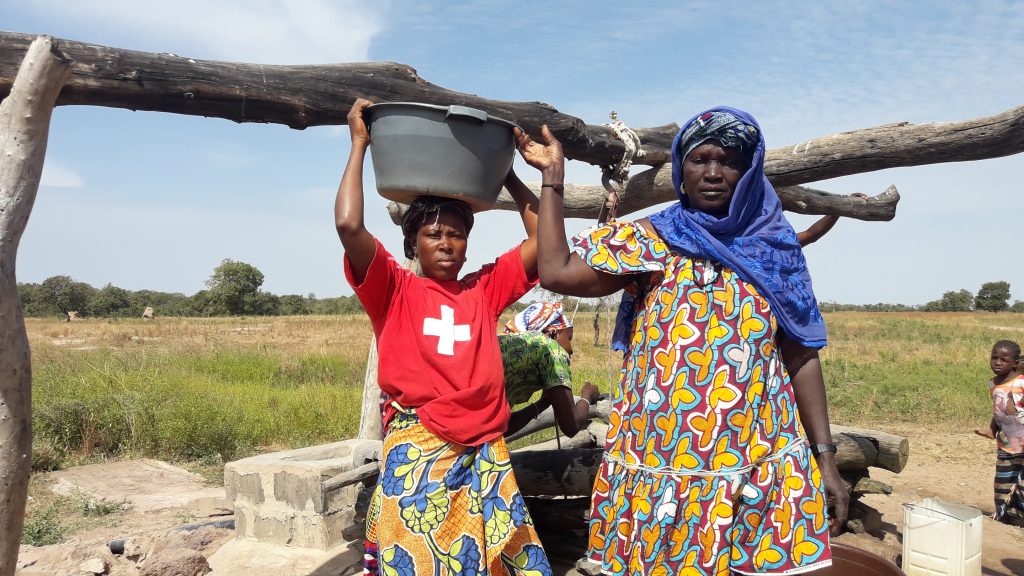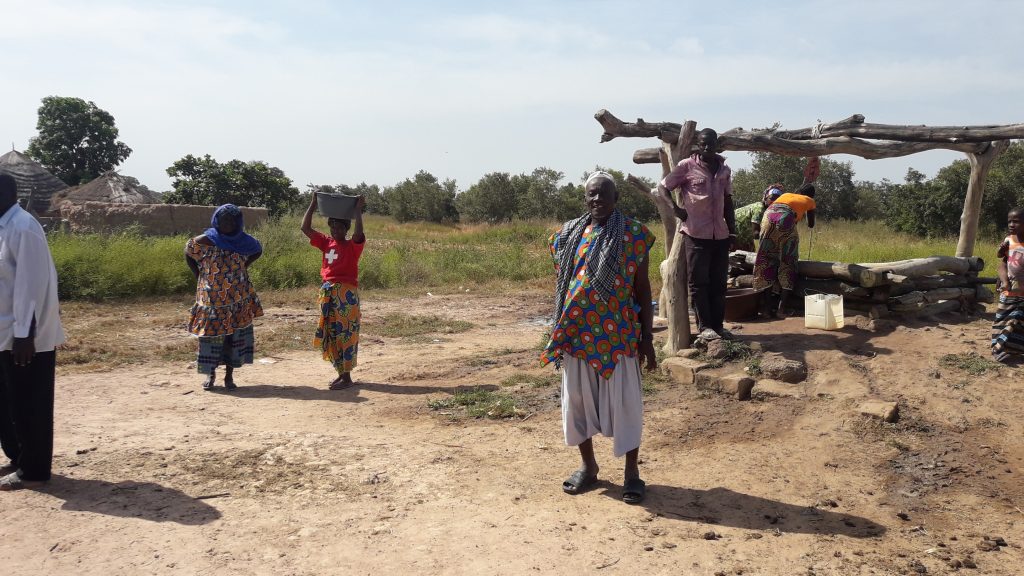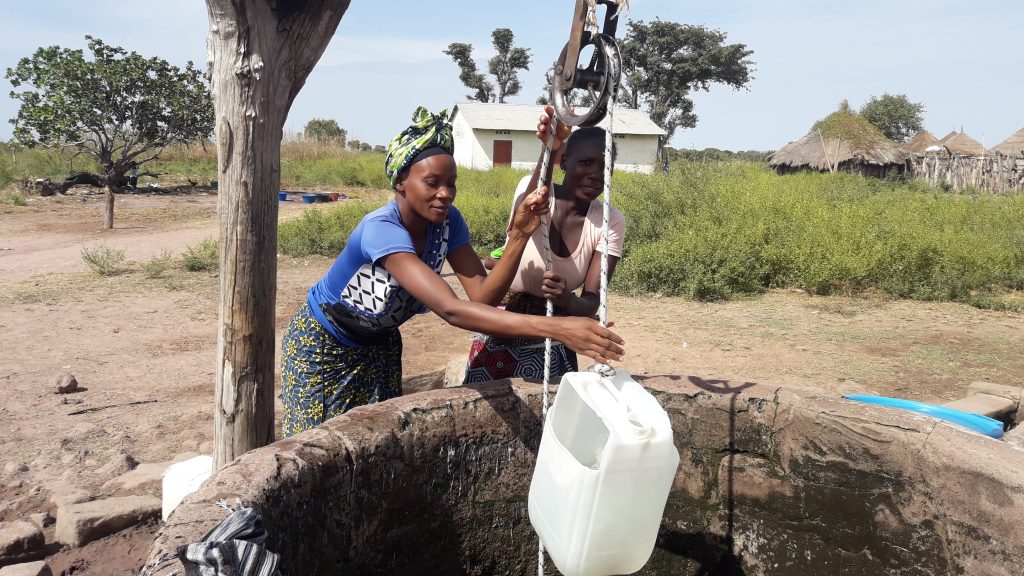Location
Galleh Wollof Village, Upper Fulladu West District, Central River Region, The Gambia
Community Description
Galleh Wollof is about 9 kilometers from Bansang off the South Bank Road in the upper Fulladu West District of the Central River Region. The community of roughly 1,700 people is made up of a sect of the Wollof tribe called the Fana Fana. Traditionally, they are settled farmers and artisans, depending mainly on subsistence farming. For centuries, this sect of the Wollof tribe has lived this way of life.
The community consists of 65 compounds, the majority of which are extended family compounds (for large families). The community never embraced sending their children to school; thus, the majority of the people in the Galleh Wollof community are illiterate. However, with an intense advocacy campaign and sensitization program by various organizations in that part of the country, children’s school enrollment has steadily risen over the past two decades. Now with direct knowledge of the benefits and importance of education, more of the community is determined to send their children to school.
Currently, their children (65% boys and 35% girls) attend Galleh Manda Lower Basic School, which is a 3-kilometer walk away from Galleh Wollof. With access to clean water, it is anticipated that the enrollment of girls will increase steadily.
Problem Addressed
The community has two open wells. One is used for non-drinking purposes only. The well is situated in a sandy area so during the rainy season the sand pollutes the water and causes diarrhea. The second well, which the people of Galleh Wollof rely on, is an old traditional well that runs dry quickly.
Recently, a child fell into the old well. Luckily, he was rescued and recovered at Bansang regional hospital. Being superstitious, the people of Galleh Wollof were scared to fetch water there and now go by donkey cart 5 kilometers across the border to Southern Senegal to fetch water. This has led to a huge disruption in their livelihood. It has also led to a local food shortage as the time spent on their subsistence farms is cut short in pursuit of drinking water.
Project Description
This project is to build a borehole in the community.
The borehole will be 6-inches in diameter and 45-meters deep. Due to the hydrology of the area, the borehole drilling outfit advised the drilling of a 6-inch-wide borehole to ensure the availability of abundant water year-round. Moreover, the area’s shallow water table will make the hand pump easy to use.
The project will also include the construction of a concrete slab and a protective fence for the hand pump. A brand new German Mark II hand pump will be mounted and a 2.4- by 1.5-meter long concrete trough will be constructed as a drinking point for livestock. This will help supply abundant clean water for the villagers, as well as help in the rearing of ruminants. The construction of a reliable water point for animals will help reduce poverty and malnutrition in the community.
Gravel, sand, cement, iron rods and the making of bricks will be provided by the community as their contribution towards the project. Any needed manual labor will also be provided by the community. They will also host and feed workers.
Water Charity funds will be used to pay for the materials and skilled labor. Community members will dig the trenches, provide the sand and gravel, and perform the less-skilled manual labor on the projects.
Project Impact
This project will benefit the village’s 1,700 residents.
Project Administration
Emily Lundberg, Ph.D., Water Charity Country Director – The Gambia, working with Mike McConnell, Managing Trustee of GambiaRising and former Country Director for Peace Corps in The Gambia, and Ebrima Marong, Water Charity Program Manager.
Monitoring and Maintenance
Water Charity Project Manager Ebrima Marong, supported by Ismaila Cham, will visit the community regularly to check that the system is working seamlessly, as well as to verify that the water management committee is functioning as it should.
A 7-member water management committee has been organized, headed by Mr. Tijan Gaye and Deputy Mrs. Yassin Boye. The committee consists of serious and dedicated people chosen by the villagers in a meeting held at the village ‘Bantaba’ (meeting place). The selection process of the committee members made sure its composition was gender-balanced. Given that women bear the brunt of water collection in the households, they should certainly have a say when it comes to water management.
To ensure the sustainability of the system, a training workshop on community management model techniques will be conducted for them. It was strongly agreed at the same meeting that a bank account will be opened by the village water committee, with three mandatory signatories, where the collected amount will be saved for future maintenance and repair or any future upgrades, if necessary.
At the end of every month, each household will pay some amount into the bank account. The committee will transparently report monthly the status of the account to the villagers at the village ‘Bantaba’ (meeting place) at meetings to be coordinated by the Alkalo (village head). This way the community will have a sense of ownership and responsibility towards the upkeep of the water system, thus ensuring sustainability.
Let Girls Learn
The project will have a great impact on the ability of community girls to remain in school. If the community has sufficient and readily available water, the community’s girls will be spared from the duty of fetching water and given time for their books and education.
Project Funding
This project has been funded by an anonymous donor. Please make a general donation to Water Charity to allow us to continue to implement great projects such as this one.
Project Conclusion We drilled a new borehole, installed a submersible Grundfos pump, and built a tower mounted with a 10,000-liter triple-coated water storage tank. The pump is powered by high-quality mono-crystalline solar panels on a galvanized solar panel frame. Ten water points were created, which will make water accessible to all villagers in this densely populated community.


